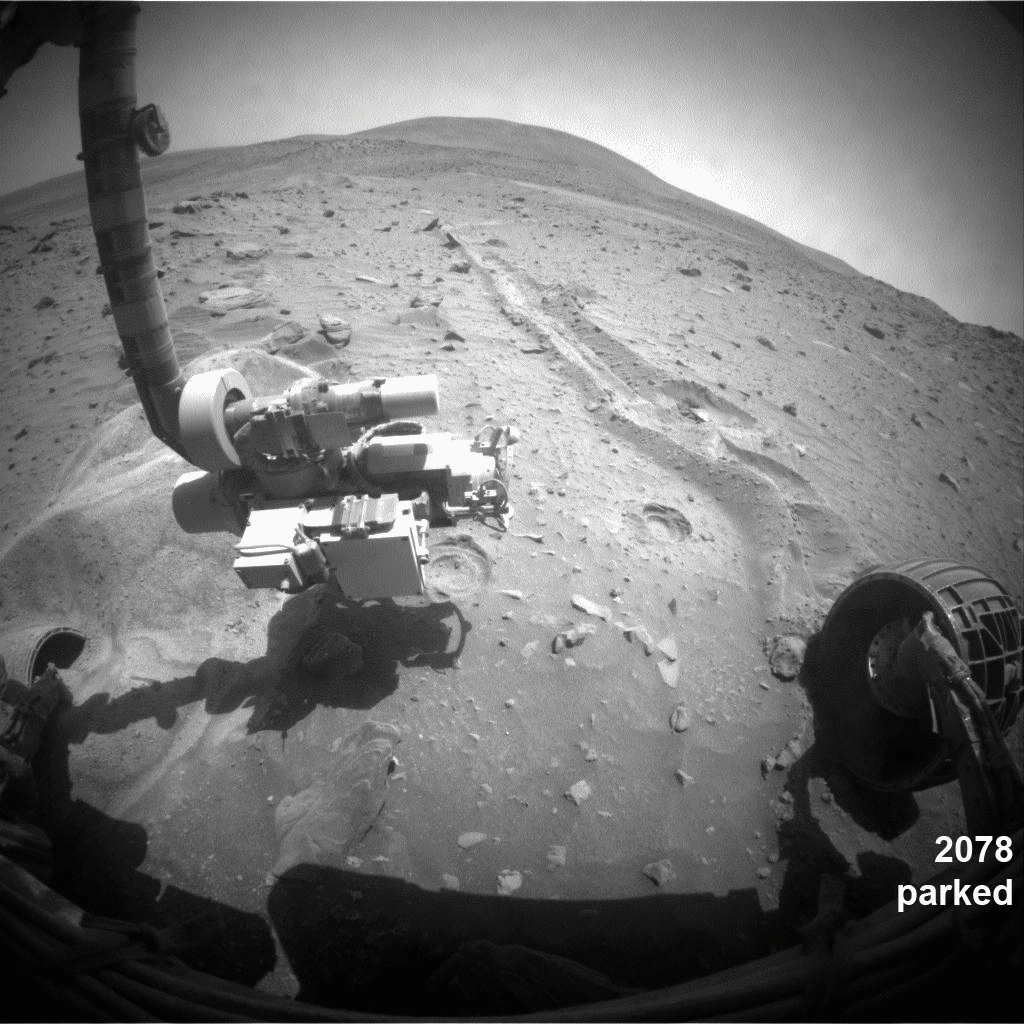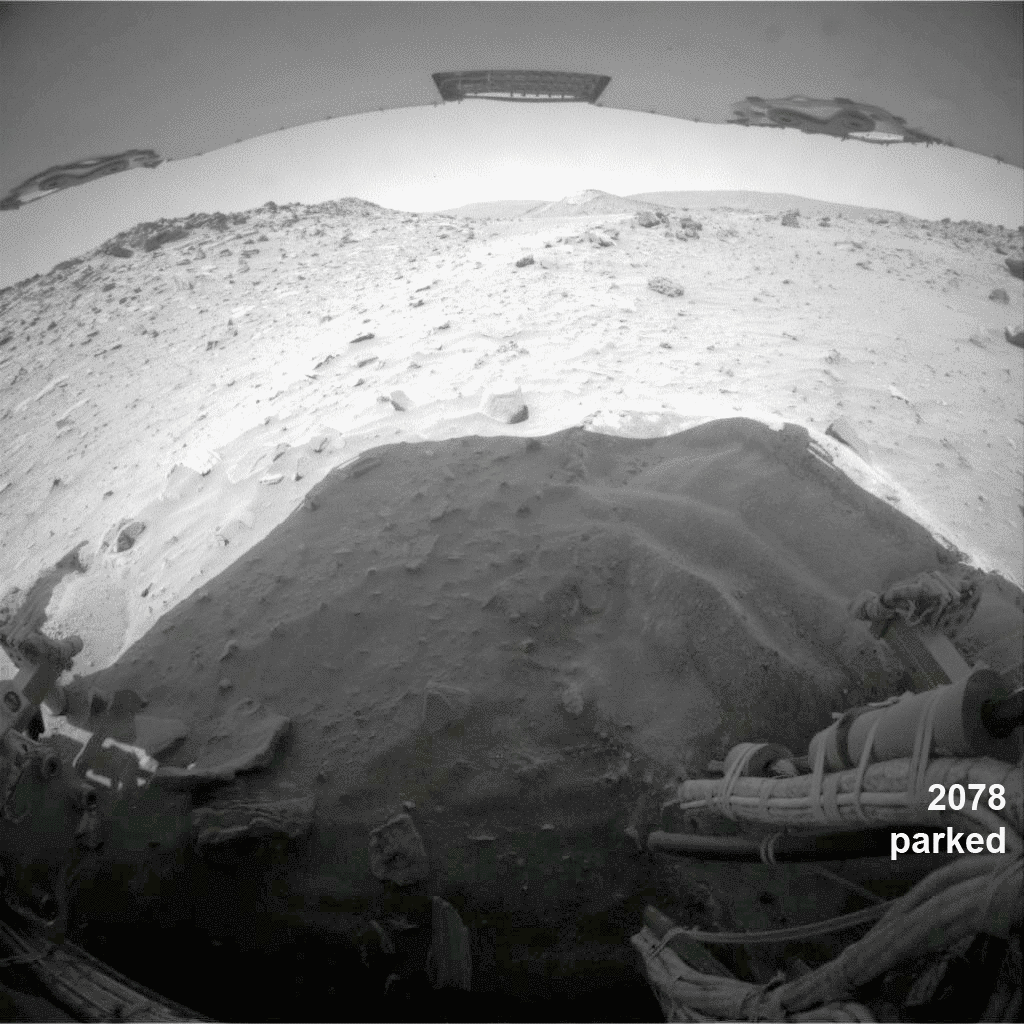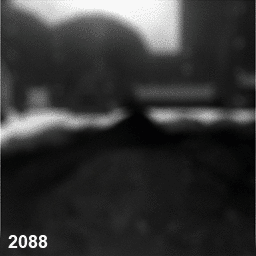Emily Lakdawalla • Nov 19, 2009
Encouraging motion on Spirit
UPDATE 7 p.m. PST: It seems there was a bit more downward motion than I detected. The JPL update says:
Spirit successfully completed the first step of its planned two-step motion on Sol 2090 (Nov. 19). After spinning the wheels for the equivalent of 2.5 meters (8.2 feet) in the forward direction, the center of the rover moved approximately 12 millimeters (0.5 inch) forward, 7 millimeters (0.3 inch) to the left and about 4 millimeters (0.2 inch) down. The rover tilt changed by about 0.1 degree. Small forward motion was observed with the non-operable right front wheel, and the left front wheel showed indications of climbing, despite the center of the rover moving downward. These motions are too small to establish any trends at this time. The drive plan had imposed a limit of 1 centimeter (0.4 inch) motion in any direction. The second step of the drive was not performed, because Spirit calculated it had exceeded that limit.
The update goes on to say that the downlink was better than expected, which means (my interpretation here) they'll be able to complete their analysis tomorrow. But I'm not sure if that means they'll be able to drive over the weekend; next drive may not be until Monday.
It really looks like the second attempt at driving Spirit out of the trap has had the hoped-for result: some forward progress (maybe about a centimeter), and no evidence for further downward sinking. The best views seem to be from the right-eye Hazard Avoidance Cameras, the belly-mounted fish-eye cameras that the rover uses to get a look at her own wheels. I'm going to give my preliminary analysis here -- I'll edit this post later with an update based upon JPL's end-of-day report.
Here's the view from the front (apologies for the large file size, but you need all the pixels to get a global view of what progress is being made).

And here's the rear view.

Things I notice:
- The right front wheel, which is the one that doesn't roll, clearly advanced forward along the ground. I think this is very good news, because it means the other wheels are getting enough traction to overcome the frictional force of that wheel dragging along the ground.
- The left wheel clearly rolled, and it must have dragged some of the soil from in front of it as it rolled, because you can see that soil has cascaded or landslided from the top of the pile of soil in front of it, leaving a scar.
- The forward view of the horizon didn't move a lot, but to the extent that it did move, the left side seems to have dropped just a tiny bit, which might mean that the front of the rover lifted up. Or it may mean that the back of the rover sank, which would be less good. Either way though, the motion is slight.
- I think I can see the rear wheels lifting a bit, but I'm less confident of that.
- However, there is definitely forward progress visible in the rear hazcam animation.
As a final gem, here's an animation of the Microscopic Imager views of the pointy rock underneath the rover, which has been some concern to rover drivers, as it's not obvious whether the rock is touching the belly of the rover. From this animation it appears that the pointy rock is receding into the distance. The images are very blurry because the Microscopic Imager was never intended to be used to view objects so far away from it -- it is very, very nearsighted. Rover driver Scott Maxwell mentioned to me a couple of days ago that these Free Spirit driving efforts mark the first time that Microscopic Imager photos have been included in the data stream with the high priority assigned to data products that are critical for mission planning.

All in all, it looks very, very encouraging, and I'm looking forward to the full report from the mission!
The Time is Now.
As a Planetary Defender, you’re part of our mission to decrease the risk of Earth being hit by an asteroid or comet.
Donate Today

 Explore Worlds
Explore Worlds Find Life
Find Life Defend Earth
Defend Earth

